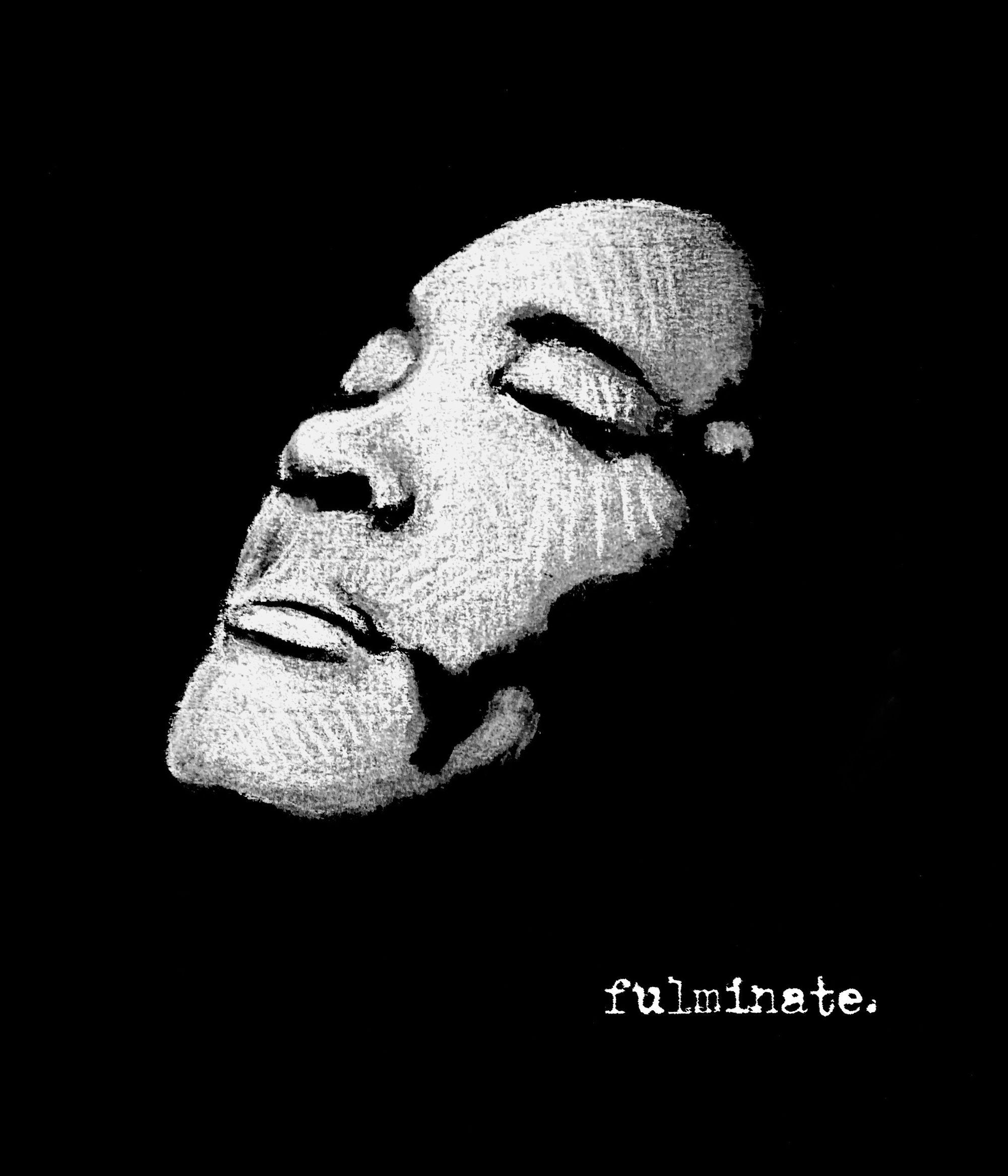What medium are you currently working in?
All types of media but mainly hip hop, production, and sound engineering.
Can you tell me a little about your current project?
Fulminate, my latest album, produced entirely by theDGTL, is my portrait of what it’s like being a black male in today’s America. I drew from the experiences of my relatives, friends, and myself.
Can you share a little about your process for creating this album?
We tried to create a piece that speaks both on a general sense and with specifics. The album draws heavily from neo-soul, golden era hip hop, spoken word, and contemporary jazz.
It is an album where not a word is wasted and is best listened to in one sitting, with the lights off and no interruptions.
What inspires you?
I draw inspiration from everything. Current events, the stories of my friends and peers, my family, nature, other forms of art like painting, film, photography.
Some of my biggest influences include Aretha Franklin, System of a Down, Royce Da 5’9, Do the Right Thing, Black Like Me, John Howard Griffin, and my siblings.
What does this album mean to you?
My intention with Fulminate was to create dialogue centered on the societal issues that are talked about on the album. I’m excited to be featured on here to discuss those questions; it’s an honor.
What is the first experience you can remember making music?
I can’t recall a first experience because in my family I was always making music with my family, whether it was listening to my aunt play her keyboard, or beatboxing and rapping with my siblings, or watching my parents record—music has always been there.
Did you always know that making music would be a central part of your life?
In some way, shape, or form, yes. Growing up I tried a variety of things—sports, different styles of art like painting and photography; music was the only thing that I would consistently work on. I didn’t really get serious about it as a career until 2013–2014-ish, though.
What is the most impactful performance you have ever been to as an audience member?
On 9/11/2013 I went to a Kid Cudi concert (damn, I miss shows) during his Indicud tour at the Wamu in Seattle, and it changed my life. I remember watching him bounce around the stage, talking to the crowd all nonchalant; he really looked like he was at home, and after he performed ‘Mr. Rager’ I remember thinking, I’m going to do this the rest of my life.
A theme I noticed in your music is the importance and power in discovering your purpose. Your work is a beautiful example of purpose and talent colliding to serve the higher good. What would you say to individuals struggling to find their purpose? How did you know music would be a part of your life’s purpose?
Thank you. Honestly, I feel super lucky because I come from such a musical family. My mom and stepdad played jazz around Tri-Cities for years. My dad’s a rapper, two of my siblings are full-time creatives, my oldest sister danced professionally, my uncle sings, my grandparents sang gospel, I could keep going, haha, but I think you get the point. I say all this to say I’ve been surrounded by music my whole life. It felt like such a natural gift to nurture and refine and has always been my favorite medium to turn to when I need to express myself. If I go through a period when I’m not making music, I’ve found that I’ll bottle up emotions and become pretty grumpy.
That being said, I feel for the people who are still searching for that thing that gives them undeniable joy and would encourage those that are seeking their purpose to try literally everything. Travel, try as many different forums of art as you can, pay attention to the news, read books—you never know how you’ll discover something you love doing until you do it.
How have personal challenges impacted your work?
Music is therapeutic for me. I’ve often found my best work comes after processing some heavy life events. There are several periods I can think of in my life where if I didn’t have music to channel my hurt, anger, pain, etc. into, I wouldn’t be here today. I draw inspiration from all aspects of my life, which includes the high points and low points.

In Fulminate you talk about using your personal experience and your voice to provide context for listeners. Many of your songs masterfully intertwine intimate introspection and reflection with wider perspective on societal issues. What does this process look like for you? Does it ever feel scary sharing your innermost thoughts with the world? If so, how do you get past that?
To be honest, it’s different from project to project. With Fulminate, once we got two or three of the demo songs recorded, theDGTL and I both knew that the project should tell a story. Our goal with Fulminate was to combine the narratives of not only myself, but the narratives of so many of my friends and family members, and with that, hopefully create the context that these societal issues are systemic and don’t affect one person, but all of us (POC) to some degree.
Sometimes it can be scary, especially live. I have a lot of respect for spoken word poets because sharing the inner workings of your brain with a bunch of people who are there to listen to every word you have to say can be overwhelming. Especially with no beat or music to fill the silence before you start! For me it helps to find a place to ‘go to’ in my head. When I’m rapping, I rap like it’s me alone in my room at 2 a.m. rehearsing like no one’s there, but it could be anywhere as long as you can really picture it in your mind and go there when you’re feeling stage fright.
Fulminate is such a powerful album title and highlights your message about how important it is for each of us to use our platforms to have uncomfortable, necessary conversations. How can people best support you and other artists doing this important work?
Thank you. Change doesn’t come without oppressors being made uncomfortable, and history has showed that.
There are several ways to show support, and I appreciate all of them! You can listen to me on any streaming service (Spotify, Apple Music, TIDAL, etc.), watch and comment on our videos on YouTube, or donate to my Cash App or Venmo ($nobi509/@nobi509). I have a big website update with a merch store coming in the near future as well.
Many of these songs were written 3–5 years ago and are still as relevant today, particularly when it comes to systemic racism. You say you drew from your experiences and those of your loved ones to create this portrait of what it is like to be a Black male in today’s America. Can you share a little more about that?
Oh man, where to start?
‘New Chains’ came from me observing my younger self and my obsession with sneaker culture and jewelry. Growing up going to a predominantly white high school and being the only Black/Asian mixed-race kid there, I stood out. When I was in high school, I would work at McDonald’s and blow my paychecks on shoes and clothes because I desperately wanted to be like ‘everybody else’ at my school. I feel like this is a microcosm of a much larger problem of self-perception and how the media markets fresh kicks and clothes as a medium for ‘cool.’
With ‘Crxrxrd’ I drew heavily from experiences with alcoholics in my family and their struggles with depression and suicide.
With ‘Purpose’ I drew heavily from friends I have who grew up poor in a traumatic home environment. In short, because of these environmental conditions, my friend ended up in prison because he felt like he had no other lifestyle to turn to.
There are so many different experiences I draw from—sometimes multiple perspectives in the same song—that I could go on forever.
You live in Seattle now, but are originally from the Tri Cities. What was your experience like growing up here, and how has it shaped your music?
I think I had a really unique experience. I grew up in a predominately white school where I had to deal with a lot of passive racism and a lot of individuals who generally didn’t know or think how their actions towards people of color could be harmful. White people saying the ‘N’ word, white people with Confederate flags on their wallets, white people using racist slurs to be funny and then when confronted about [it], saying that it was just a joke, etc. A parent once said to me on the way to football practice, “Oh you’re Black and Asian, so you must be good at math AND at sports! How lucky you must be.” Shit like that… haha.
So when I talk about Fulminate providing context, it’s these people I hope hear it.

Can you tell me a little bit about the inspiration for the album cover?
Selecting the album cover was one of the last things we did, actually. We had discussed a laundry list of ideas and nothing was sticking. Then one day I was digging through some old vinyls at my house and I found a copy of James Brown’s ‘Say it Loud! I’m Black and I’m Proud!’ On the inside cover of the vinyl there was, what looked to me, like a chalk or charcoal sketch of his face. I thought to myself, what if we put our own spin on that concept? To me it felt poetic because James Brown was talking about a lot of the things I talk about in Fulminate in his own way, years and years ago. I thought it was a creative way to show that we have been fighting for our rights through music for eons.
Your song ‘New Chains’ speaks on the topic of economic oppression. Can you tell me more about that and why this conversation is so important?
‘New Chains’ is a play off of Kanye’s ‘New Slaves.’ It’s basically an examination of our (hip hop) fixation on expensive material items and why that can be potentially harmful. Placing things like expensive jordans, jewelry, and cars, on a pedestal—to the point where people are making themselves go broke to feel rich—is toxic. I believe that we need to take a hard look at where we are spending are money and do more to keep that dollar within our own community.
What is your favorite expression of creativity outside of making art?
Haha, weird as it is, I enjoy toy photography. During quarantine, I got bored one day and started taking pictures of some action figures I had. I enjoyed creating the environment around them to bring the toys to ‘life’ in a sense.
Where can people find you online?
Web: www.nobisays.com
Instagram: ayoblasian
Twitter: ayoblasian
YouTube: Marquise Green
Main image by James Gerde @soaringhawkabove, flower crown done by LZ @moonbloomfloral, courtesy of Nobi.
Ashleigh Rogers is the Artist Feature Editor at DrewBoy Creative http://www.drewboycreative.com/.


